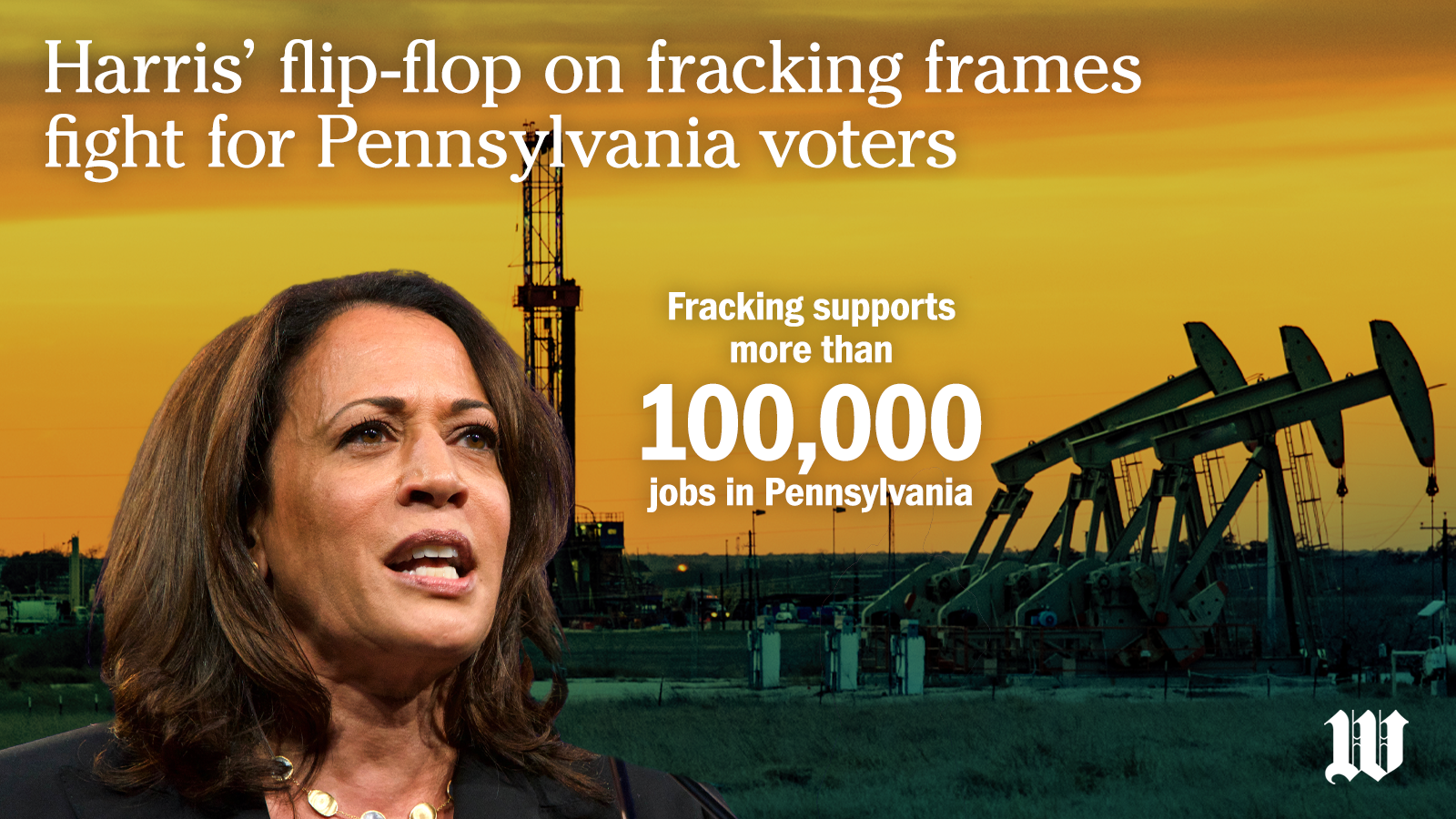Once an advocate of a complete ban on fracking, Vice President Kamala Harris reversed course when she became the Democrats’ presumptive presidential nominee.
The 2024 election hinges on Pennsylvania voters. Fracking, the extraction of natural gas and oil from bedrock, makes up a critical part of Pennsylvania’s economy, supporting more than 100,000 jobs in the state, according to a recent analysis.
Ms. Harris, who has embraced the Biden administration’s commitment to a net-zero electrical grid by 2035 and net-zero carbon emissions by 2050, has long supported an end to the fracking industry. She aligned herself with climate activists who are dedicated to ending fossil fuels and converting the nation’s energy to renewables such as solar and wind.
“There’s no question I’m in favor of banning fracking,” Ms. Harris, who built her political career in California, told CNN during her failed 2020 presidential bid. During the same CNN appearance, Ms. Harris endorsed the Green New Deal, a plan to ban fossil fuels.
Ms. Harris said during the interview that if elected president, her top priority to address climate change would be, “installation and maintenance of wind turbines and solar paneling.”
Now that she’s on track to lead the 2024 Democratic ticket, Ms. Harris backed off her anti-fracking pledge and talks little about ending fossil fuels as she vies for a win in Pennsylvania, which has 19 electoral votes at stake.

New polls show Ms. Harris running about even with former President Donald Trump in Pennsylvania.
The fracking flip-flop may throw Ms. Harris a political lifeline in the state, particularly in the rural areas where Democrats have lost ground in recent elections, a pollster observed.
Pennsylvania is the nation’s No. 2 producer of natural gas, trailing Texas only slightly.
“Fracking is an important issue both economically and symbolically for many of the state’s rural residents, so being supportive of that industry at least gives voters in those areas — areas where Democratic presidential candidates have struggled — a reason not to immediately discount her campaign,” said Berwood Yost, director of the Franklin & Marshall College Poll, based in Lancaster, Pennsylvania.
President Biden won the state by 1% in 2020 and Mr. Trump won it in 2016 by less than 1%.
Along the way, the energy industry has become an increasingly critical part of the Pennsylvania economy, particularly in the state’s rural southwest region.
A Pennsylvania analysis produced by the Marcellus Shale Coalition found that the state’s natural gas sector supported 123,000 jobs in 2022, contributing more than $41 billion in economic activity and generating $3.2 billion in state and local tax revenue.
The study, conducted by energy economists at FTI Consulting, calculated that natural gas production royalties paid to extract natural gas on private and government land reached $6.3 billion in 2022.
Mr. Trump recently wielded Ms. Harris’ anti-fracking pledge over the voters of Pennsylvania, calling into question her new stance.
“She pledged to abolish fracking,” Mr. Trump said during a rally last week in St. Cloud, Minnesota. He added, sarcastically, “That should do well in Pennsylvania.”
Officials with Ms. Harris’ campaign immediately called Mr. Trump’s statement “false,” and “an obvious attempt to distract from his own plans to enrich oil and gas executives at the expense of the middle class.”
Ms. Harris, they said, aligns herself with Mr. Biden, who has not supported fracking as president.
Andre Beliveau, senior manager of energy policy at the Commonwealth Foundation, a Pennsylvania think tank, said state voters may not buy Ms. Harris’ shift on fracking. Ms. Harris, he said, has worked alongside Mr. Biden to implement other regulations, policies and laws aimed at ending natural gas production.
Mr. Biden and Ms. Harris in April announced a new power plant rule that would limit new natural gas plants by 2040 and in January implemented a temporary halt on exporting liquefied natural gas. The Biden-Harris administration has also provided lopsided tax incentives to renewables that have made natural gas less competitive, Mr. Beliveau said.
“Policies will always speak louder than words,” Mr. Beliveau said. “When voters look at what the Biden-Harris administration has done the last four years when it comes to energy policy, they will probably feel similarly.”
Mr. Yost said fracking in Pennsylvania is a geographically divisive issue — in other words, some residents oppose it out of environmental or safety concerns, but they tend to be those residents who do not rely on the industry for jobs or other economic benefits.
A 2019 Kaiser Family Foundation and Cook Political Report poll found 57% of swing voters in the state opposed a fracking ban while 39% of swing voters supported a ban.
There is no guarantee Ms. Harris’ reversal on fracking will help her politically, Mr. Yost said. “Would supporting a fracking ban hurt? Definitely.”
• Susan Ferrechio can be reached at sferrechio@washingtontimes.com.



Please read our comment policy before commenting.